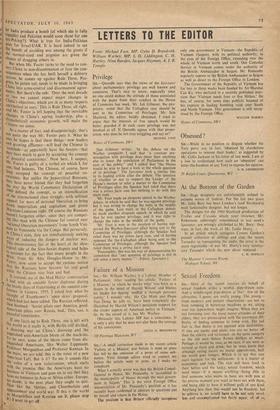LETTERS TO THE EDITOR
From: Michael Foot, MP. Gyles D. Brandreth, William Warbey, MP, S. H. Liddington, C. H. Hartley, Nina Bowden, Jacques Heyman, A. J. B. Temple. •
Privilege
SK—Quoodle says that. the views of the Spectator about parliamentary privilege arc well known and consistent. That's nice to know, especially since no one could deduce the attitude of those associated with the paper from their conduct in the House of Commons last week. Mr. Ian Gilmour. the pro- prietor. voted that the Callaghan case should be sent to the Committee of Privileges. Mr. lain Macleod, the editor, boldly abstained. I tried to argue that the interests of free speech would be better guarded if in such cases privilege was not invoked at all. If Quoodle agrees with that propo- sition, why does he not stop wriggling and say so?
House of Commons, SW!
MICHAEL 1.00T
[Ian Gilmour writes: 'In the debate on the Warbey complaint I said that "a constant pre- occupation with privilege does more than anything else to lower the reputation of Parliament in the eyes of the public," and I added that "the House would be wise to have a look at the whole question of its privilege." The Spectator took a similar line in its leading article after the debate. The question of whether or not to support the Leader of the House's motion to refer a matter to the Committee of Privileges after. the Speaker had ruled that there was a prima jack case has nothing. to do with this main issue.
`Mr. Foot made an eloquent speech in the Warbey debate, in which he said that he was. against privilege but it was wrong to change the rules in the middle of the game. Last week in the Callaghan debate he made another eloquent speech, in which he said that he was against privilege, and it was right to change the rules in the middle of the game. 'Mr. Foot is now in the position of having sup- ported the Warbey-Spectator affair being sent to the Committee of Privileges, although the Speaker had ruled there was no prima facie case, and of having opposed the the Callaghan affair being sent to the Committee of Privileges, although the Speaker had ruled there was a prima facie case. 'Presumably, this was his way of demonstrating his Contention that "any question of privilege is not 'in• any sense a party matter." '—Editor. Spectator.]
















 Previous page
Previous page